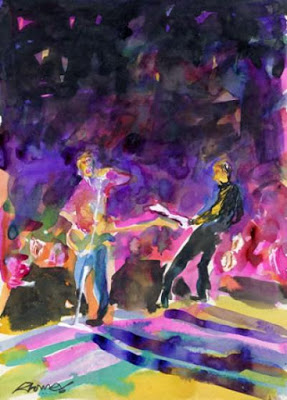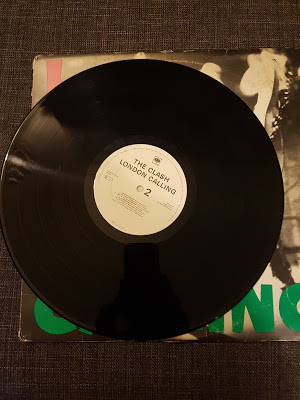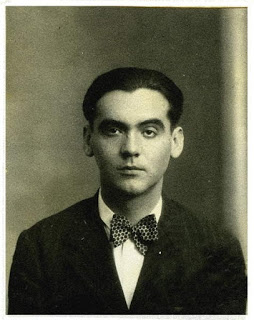
Flip side three over, the drama of The Card Cheat fading in your ears. Place it on the turntable, lift the arm of the stereo, let’s have it, London Calling side four.
Lover’s Rock opens up side four and it’s the worst song on the album for me, by some distance. The tune is alright and Mick’s guitar playing has some moments but it’s a one idea groove largely. The song’s title is named after the hugely popular, commercial style of 70s reggae, a genre with some brilliant songs from artists such as Janet Kay, Dennis Brown, John Holt and Susan Cadogan. However Joe’s lyrics are confused or confusing. In the first verse he tells the listener to ‘treat your lover girl right’ but then goes on to blame her for forgetting to take her contraceptive pill and warns that ‘no one will know the poor baby’s name’. In the second verse he steps into a book he was reading at the time, The Tao Of Love And Sex, and points the finger at western men who need more self control in the bedroom before setting out what a genuine lover should do-‘… take off his clothes/ he can make his lover in a thousand goes’. I don’t know what Joe was intending with this song- a genuine attempt at dealing with sexual politics? A pisstake of lover’s rock’s lyrics? Shaming men for the way their bedroom technique? Whatever he meant, I don’t think it works and it’s causes the only real dip in quality across the nineteen songs. Best to move on, move to….
Tsk- tsk- tsk- tsk clang! Four Horsemen!
‘Well they gave us the grapes that go ripe in the sun
That loosen the screws at the back of the tongue’
Four Horsemen is a ridiculous song (in a good way) and I love it. After all the apocalyptic mayhem, nuclear errors, card cheats, murders, capitalist alienation and sufferation Joe now imagines the band as the Four Horsemen- not the biblical ones from the Book of Revelation bringing war, pestilence, famine and death but four comical horsemen. These horsemen do not bring the end of the world but are ageing, stoned incompetence-
‘One was over the hill
One was over the cliff
One was licking them dry
With a bloody great spliff
When they picked up the hiker
He didn’t want a lift
From the horsemen’
The Clash loved to write about themselves- see Clash City Rockers, Garageband, All The Young Punks and The Last Gang In Town for starters- but here Joe has his tongue planted well in his cheek. Maybe this adds to the argument that the previous one is a joke and what opens side four is a pair of joke songs. Four Horsemen is definitely here to lighten the mood, not to be taken too seriously, but for all that Mick’s tune is a belter, Topper is hammering those drums full pelt and Joe gives a full throttle vocal performance. The verses tumble by in a mass of words and images, a crashing chorus, a middle eight with a spoken vocal part (a bit of a recurring technique of the album) and over the ending Joe singing ‘we know, only rock ‘n’ roll/we got rock ‘n’ roll’. The band freak out, guitars squealing and Topper pounding leading to an over the top, crescendo. It’s almost Death Or Glory inverted, or a Bizarro World version of it. Then there’s the final one of those clever segueways leading us straight into I’m Not Down.
Mick piles into I’m Not Down with a pair of chords and then Paul comes in with a lovely bass riff, a bar or two of funky guitar and when Mick calls ‘hup’ they lock into a great descending riff. Paul’s bass playing on this is superb and Mick’s guitar shines throughout, several Les Paul parts stacked up. Mick sings I’m Not Down, very much an autobiographical song detailing the things that have gone wrong in his life over the previous year, singing and playing his way out of bad times-
‘I’ve been beat up, I’ve been thrown out
But I’m not down, no I’m not down’
At the end of 1978 his flat had been burgled, he was attacked in the street by a group of Teddy Boys and then early on in 1979 his relationship with Viv Albertine ended. After all the topics Joe has written about on the album, from Three Mile Island to the Spanish Civil War, from drug dealers to working for the clampdown and then the comic nature of Four Horsemen and God knows what of Lover’s Rock, Mick doing a bit of self- affirmation and positive thinking Clash style is rather good. A proper, singalong, arms aloft Mick Jones song.
Revolution Rock then arrives to take us through to what should be London Calling’s end, a cover of a Danny Ray and The Revolutioneers song, the original out not long before The Clash recorded their version. I once played this song when DJing at a wedding and it down a storm. Revolution Rock is introduced by a Topper drum roll and then those frisky, catchy Irish Horns. This is The Clash go party, percussion and cheese graters leading the way, horns and dance rhythms after all the dread. Joe makes a few lyrical changes, turning ‘everybody get off their seat and rock to this brand new beat’ into the punkier ‘everybody smash up their seat…’. At the end of London Calling El Clash combo sign off with reggae and calypso via West London at the tail end of the 70s, a song to raise the spirits and end the night. Joe slips in a reference to Mack The Knife with the line ‘careful how you move Mac, you dig me in the back/ And I’m so pilled up that I rattle’ but ultimately this is a rave up and a celebration with Joe exhorting ‘tell your Mama Mama/ tell your Papa Papa/ everything’s gonna be alright’. The drop in the middle with the organ break and then Joe and the band coming back in is nothing short of wonderful. As the horns and organ and drums/bass/guitar begin to wind up their circling groove Joe goes into full on sequined jacket entertainer mode with the show band end of song announcement…
‘Any song you want
Playing requests now on the bandstand
El Clash combo
Paid fifteen dollars a day
Weddings, parties, anything
And bongo jazz a speciality…’
Revolution Rock
And that should be that but at the very end of the sessions, almost as the amps are unplugged and lights turned off Mick turns up with another song, one written the night before- Train In Vain. Riding in on a chugging railway rhythm, a superb instantly recognisable drumbeat from Topper, some harmonica and a funky guitar riff, and Mick’s feathery vocal about being left and alone, Train In Vain is a Clash pop song and none the worse for it. There’s a nod to Tammy Wynette in the my- girl- done- left- me lyrics (and she had left him Train In Vain being the second song on the album to be written in the aftermath of Mick’s break up with Viv Albertine) and to Ben E King with the ‘stand by me’ refrain. Mick’s in fine voice on the song especially the bit where he sings the ‘you must expl-ai- ai- ainn… why this must be’ part and it’s genuine and heartfelt. Joe was a bit dismissive of the song, a corny love song in his view, making vomiting faces when they played it live sometimes. It broke them in the USA though, a top 30 single. Viv, no stranger herself to being confrontational and spiky not least in song lyrics, says in her book Boys Clothes Music it is one of her favourite Clash songs.

Train In Vain wasn’t listed on London Calling’s sleeve. This led to various rumours and for a while it was going to be put out on an NME flexidisc giveaway but this fell through so it was put at the end of the album, the sleeve having already gone to print but the discs not yet gone to press. It’s difficult to imagine London Calling without it and after everything you’ve listened to and engaged with over the four sides that precede it, it’s a great way to fade out. On 18th February 1980 they played it at Lewisham Odeon, a gig some readers of this blog attended.
I used to work with a man who lived next door to Ray Lowry in Waterfoot, Lancashire. Ray was the cartoonist and illustrator who designed the album’s famous cover and then accompanied The Clash, at Strummer’s insistence, as their official war artist, sending hand drawn and written accounts to the NME as they toured the USA. My ex- colleague said Ray was a lovely bloke, a genuine character with tales to spare. Sadly Ray died in 2008 but there was an excellent exhibition of his work at Salford Art Gallery in 2009/2010 which I went to. There’s lots of his work here.


The sleeve obviously is legendary mainly due to Pennie Smith’s shot of Paul as he brings his bass guitar down on the stage at the New York Palladium, taking out his frustrations at the seated venue and the gig, his skinny, splayed legs instantly part of popular culture. Pennie famously had to step back quickly to take the picture and has always said it’s slightly out of focus- Joe always insisted it was the album cover from the moment he saw it. I’ve always loved the shot of Mick on the back cover too, skipping out of the spotlight onstage in Atlanta, Georgia with the crowd right up against the lip of the stage, no crush barriers or photographer’s pit, no distance at all between band and audience.

Value for money was a punk trope, the importance of not ripping the fans off was paramount. ‘Two albums for the price of one’ Joe claimed regarding London Calling and later ‘no Clash album will ever cost more than a fiver’. CBS didn’t agree. The band took a hit on the price of London Calling with (I think) it having to reach a sales figure of 100, 000 before they started making money from the royalties. The 40th anniversary vinyl re-issue is priced at £34.99, with a transparent sleeve that is removable so you can take off Ray Lowry’s Elvis inspired typography to see Pennie Smith’s shot of Simmo about to destroy his bass on its own. I’ll resist the temptation at that price thank you very much. Even with inflation factored in that’s a lot of money. Maybe, as The Clash pointed out themselves earlier in 1979, that’s The Cost Of Living. Or maybe its just another example of turning rebellion into money.
The punks and the purists say that London Calling is a long way from punk, and I suppose it is a long way from Year Zero, ‘No Elvis, Beatles or Rolling Stones’ and the absolute single mindedness of 1976. But The Clash had realised sounding like 1976 forever was a dead end and as a group they had to move on. The whole point of signing to CBS was to reach as many people as possible. Critics say that London Calling just put the group into the tradition of rock history, aligning them with the very lineage they were supposed to be a break from. They say that London Calling’s rebellion is posturing, a safe and comfortable rebellion, with the familiar sounds of ska, rock ‘n’ roll, reggae, soul, funk and rock all showing that the band were never really punks at all. But there’s plenty in the nineteen songs on these four sides which is exhilarating, confrontational, questioning and infused with the electricity of punk, the raw spirit of what fired them up in the first place. There were bands at the same time going deeper, going to the existential extremities of post punk- PiL released Metal Box in the same year, Unknown Pleasures came out earlier in 1979, both are more internalised, bleaker and more experimental excursions out of the punk. London Calling isn’t an internal expression of bleakness or suppressed emotions, it looks out into the world, takes glee in the colours and varieties on offer, takes shots at those in power and stands up for the underdog. Punk, looking back, wasn’t a new start, it was a full stop, the last gasp of the cycle of garage bands that began in 1955, spun round to 1966 and arced again in 1977. The new start was what came next, the splintering of the new groups and sounds in a thousand directions, something which continued to resonate in the next youthquake of the late 80s. The Clash found their own road out of punk’s cul de sac with London Calling, a record that is thrilling, emotional, open minded and most of all alive.
Paul Simonon ‘I never wanted to go back and relive the glory days, I just want to keep moving forward. That’s what I took from punk. Keep going. Don’t look back.’
Filed under: danny ray and the revolutioneers, guy stevens, pennie smith, Ray Lowry, The Clash, viv albertine | Leave a comment »








